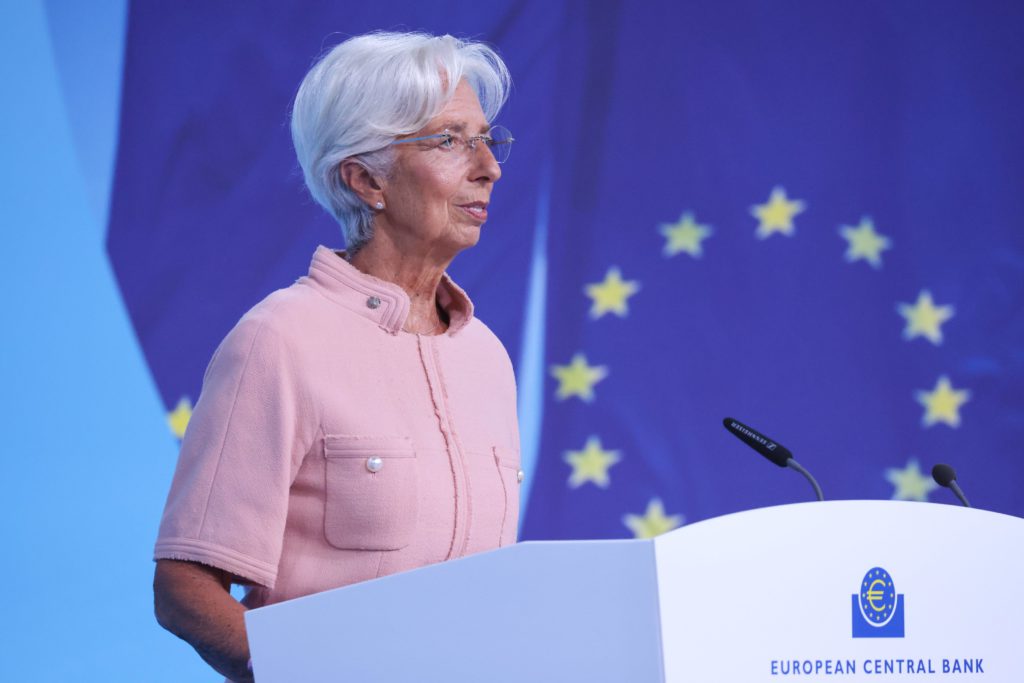(Bloomberg) — The European Central Bank will slow the pace of its pandemic bond-buying program in the final quarter of 2021, a shift President Christine Lagarde insists isn’t a move heralding a wind-down in stimulus for the euro-region’s still-vulnerable recovery.
“The lady isn’t tapering,” she told reporters in Frankfurt, describing the ECB’s decision on Thursday as “a recalibration of the pandemic emergency purchase program for the next three months.”
Lagarde spoke after the Governing Council decided it will conduct purchases at a “moderately lower pace” than the roughly 80 billion euros ($95 billion) of monthly acquisitions deployed in the past two quarters. She justified the decision by saying the euro region’s “increasingly advanced” rebound could be maintained with less monetary help.
The president also cautioned that the global spread of the delta variant could yet delay the full reopening of the economy. Officials, who revealed new forecasts showing inflation will still undershoot their target, reiterated a pledge to keep the 1.85 trillion-euro program running until March 2022 or later if needed, signaling they’re not yet ready to discuss ending the measure.
The ECB’s move to persist with stimulus contrasts with major central banks elsewhere, a differing stance Lagarde’s comments implicitly emphasized. The U.S. Federal Reserve and the Bank of England have signaled their intention to gradually unwind crisis-era aid.
The timetable for slower purchases in the next three months now makes the Dec. 16 meeting a crucial one for the future of the central bank’s stimulus programs. While the president said the decision was unanimous, keeping that consensus may be a challenge among policy makers whose judgments on the threat posed by inflation are known to differ.
New staff forecasts showed a stronger near-term outlook for prices and growth, though still insufficient to fulfill its mandate. Inflation will average only 1.5% in 2023, below its 2% target.
Lagarde’s balanced message to investors meant the ECB was able to dial down its level of stimulus without provoking an immediate market backlash. The euro trimmed gains as she spoke, trading little changed on the day at around $1.1825 as of 5:58 p.m. Frankfurt time.
What Bloomberg Economics Says…
“This is a somewhat more hawkish outcome than Bloomberg Economics expected and may raise questions about the credibility of the ECB’s commitment in its strategy review to more “forceful or persistent” action at the effective lower bound.”
–David Powell, Maeva Cousin: euro area economists. Click here for full REACT.
“This is not a tapering decision, as ECB President Lagarde stressed,” Elga Bartsch, head of macro research at the BlackRock Investment Institute, said in an emailed comment. “Asset purchases look here to stay as the new policy framework paves the way for looser for longer monetary policy in the euro area.”
Mark Dowding, who oversees $70 billion at BlueBay Asset Management LLP, was less convinced by Lagarde’s protestations.
“To me it is just semantics,” he said. “It is a choice of words. It looks like a taper and smells like a taper, so markets will view it as the start of the taper process.”
Follow the press conference on our live blog
Officials set their monthly target for purchases at between 60 billion euros and 70 billion euros, agreeing a specific goal within that range that still gives them flexibility to buy depending on financial-market conditions, Reuters reported, citing unidentified people.
With supply-chain disruptions and resurgent virus infections threatening to undermine the recovery and medium-term price pressures likely to remain well below its goal, officials have insisted in recent weeks that the euro-area economy is in a different state than the U.S. and remains reliant on ECB support.
Yet some governors have started to warn publicly that maintaining an ultra-accommodative stance for too long also carries risks. Austria’s Robert Holzmann and Klaas Knot of the Netherlands both told Bloomberg in separate interviews last week that emergency asset purchases should end in March, hinting at heated discussions about the policy path in the months ahead.
The ECB’s main guide will be financing conditions across the 19-nation bloc. Government bond yields and the euro slid over the summer months, before picking up again recently in anticipation of Thursday’s announcement.
Policy makers also took the following decisions:
The deposit rate remains at -0.5%
Interest rates won’t rise until projections show inflation sustainably at 2% and underlying price pressures are consistent with that goal
An older asset-purchase program continues at 20 billion euros a month
Long-term loans to banks will continue to support lending
(Updates with report on buying range in 12th paragraph)
More stories like this are available on bloomberg.com
©2021 Bloomberg L.P.











